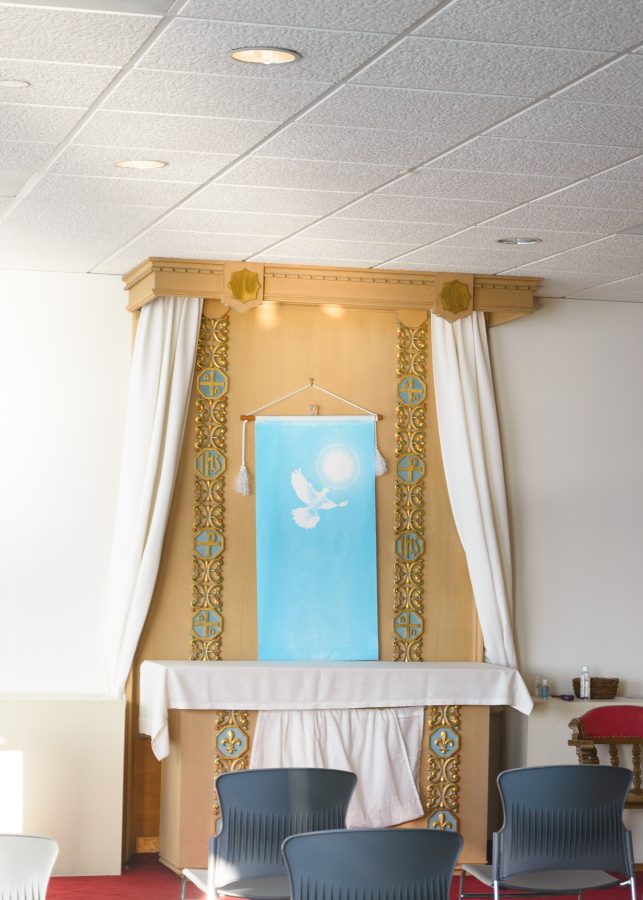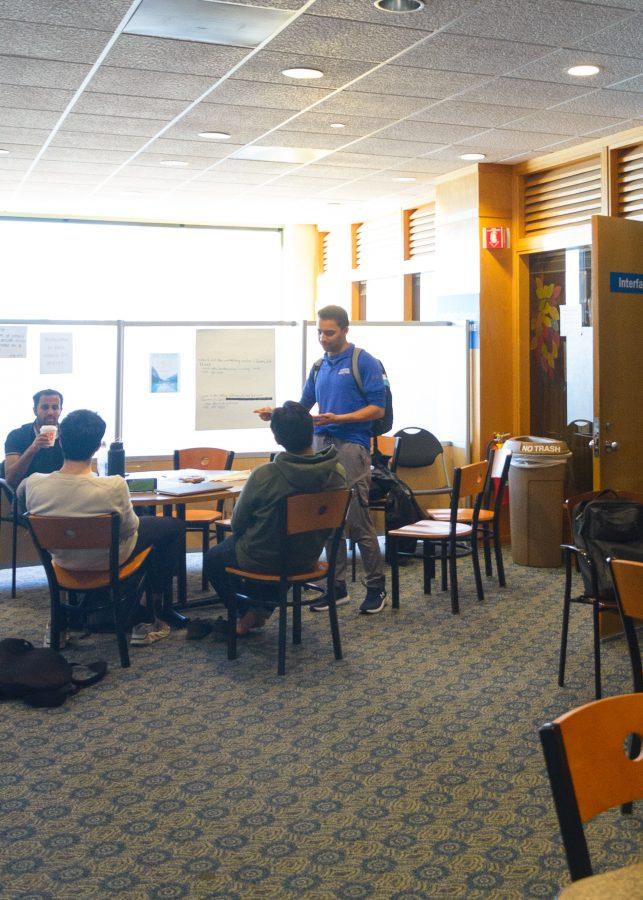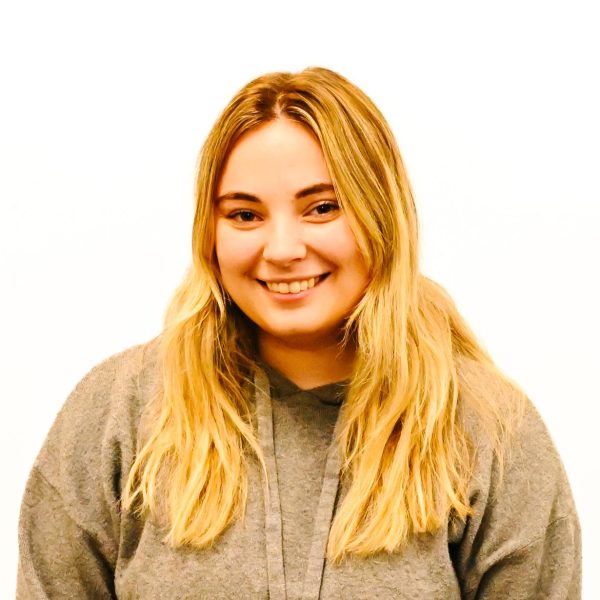Last week, I had the opportunity to sit down with Reverend Valeria Schmidt of UMass Boston’s Interfaith Ministry. I know most of you reading probably have no idea what the Interfaith Ministry is. Neither did I until I met Valeria: “I usually introduce myself as ‘Reverend Valeria’ just to make it clear what my title is, but I don’t expect people to call me that,” she told me—and to be honest, it’s still a little confusing. But as with most people who work at UMass Boston, Valeria has clearly learned to embrace the confusion and make the most out of it. So, being driven by my obsession with getting Beacons to engage with our campus organizations and clubs, I’m going to tell you a little about the Interfaith Ministry in the hopes that it will help to spread the word and get people engaged.
In talking with Valeria, it seems like the Interfaith Ministry itself is really just a room that the school allots for spiritual worship of any kind. Some religious programs are held here, such as a Catholic mass four times a week on Tuesdays, Wednesdays, Thursdays and Sundays; Bible study; ‘mindfulness meditation’ and ‘chill zone’ programs on Tuesdays from 12:15-12:45 p.m.; and Muslim prayer sessions. There are currently two faculty members—Reverend Valeria, who is a Protestant minister, and Father Don Brick, who is a Catholic priest. Both of them are funded by non-profits, not the school. As Valeria tells it, the school “wants them there” but they do not work directly for the administration.
I actually looked into the organization that funds her part-time job as protestant minister at UMass Boston—it’s called Oasis of Faith Campus Ministries—but didn’t come up with much more than a rather vague Facebook page. As such, it’s hard to judge the ethics of this organization, but on the surface level, it seems on the up-and-up.
Truthfully, I was a bit skeptical going into this interview. I am not a religious man, and though I don’t disparage those who are of one faith or another, I generally have a very low opinion of religious institutions. There’s just too much bad history, too much institutionalized abuse and too much intolerance and hate. But I have to say; I like Valeria. She is incredibly open and accepting, and is outwardly and strongly supportive of all those who face oppression. She spoke about wanting to be a part of making our campus a safe space and acknowledged that: “there’s all sorts of oppression and discrimination, not only based on religion, but often it is nourished by religion unfortunately. I’m speaking about the church, you know, historically.”
Despite the checkered history of the church, Valeria herself does have experience as a pastor in The United Church of Christ and American Baptist Churches, but “more on the progressive end of the protestant tradition,” as she tells it. This alone makes her a good fit for UMass Boston, in my estimation. She’s also a student at Hartford International University for Religion and Peace, pursuing a master’s degree in chaplaincy, which is cool because she very much understands the stresses of being a student. “I understand my role here [is] to offer support, because I know it’s really, really stressful to be a student”, she told me. “And, you know, being a healthy person, I think, includes having a healthy soul—whatever that may look like…in your own life.” And that expertise and chaplaincy is actually a huge plus in my opinion; Valeria told me she wasn’t “here to evangelize” or “convince anyone of her beliefs,” but rather to offer spiritual support in general.
One thing that stood out immediately was that the only formal religious representation was of a Christian sort—Protestant and Catholic. There is a large Muslim presence and a space for them to pray, as Valeria pointed out, but no resident Imam or other religious leader. Currently, there is no Buddhist or Hindu representation either—something I find very strange and sad, as we have a huge number of students from India and Southeast Asia.
Valeria is acutely aware of this, though, and is actively trying to improve the situation, which is very heartening. As an example, she has reached out to Hillel, which is the leading organization for the Jewish faith on Boston campuses, as there is currently no Jewish presence at the Interfaith Ministry. Evidently, Hillel would be happy to have a presence at UMass Boston, but would need to see a demand for it. As such, Valeria expressly encourages students of any faith to come talk to her about starting a program for their faith. I love this; you know me and my obsession with student engagement, and she seemed super excited about the prospect of students coming to her for help in organizing.
One of my biggest concerns coming into this interview was in how the Interfaith Ministry plans to deal with the extreme religious groups that occasionally come to our campus to spread their hateful rhetoric. So, I asked Valeria about this. “My mantra is love, and I know that’s…kind of cliché but, to me, it’s really the answer to everything,” she told me, “It means accepting people for who they are, regardless of who they are, right, or who they love or how they identify.” Reinforcing her vision of playing a supportive role, she explained that she wants to provide care to students who have been harmed by such rhetoric and provide a different perspective, rather than engage with people whose minds won’t be changed.
Her heart definitely seems to be in the right place, and I can personally vouch for her amazing listening skills and caring demeanor. She told me, “I will always speak up for people who are being oppressed, that’s for sure.” However, I would like to see a stronger, more proactive response to these groups. Since the Ministry isn’t directly affiliated with the school, it is, admittedly, hard for them to put out mass statements, but Valeria did imply that it was possible. With that said, I do agree with her that directly debating with extreme, hateful groups is probably not the best course of action.
Overall, I was very pleasantly surprised by the Interfaith Ministry. Its current form is certainly lacking—there definitely needs to be more representation of non-Christian faiths—but Valeria is excited and more than willing to work to include anyone who wishes to be represented. It seems to be a very welcoming space in general, and a safe space for marginalized communities of any kind.
If you’re interested in the Interfaith Ministry in any capacity, please reach out to them! The room is on the third floor of McCormack, at the back of Ryan Lounge; just follow the signs. Valeria can be reached at Valeria.Schmidt@umb.edu or @umbprotestantministry on Instagram and is generally on campus on Tuesdays and Wednesdays. Father Don is in his office on Tuesdays from 2-4 p.m., and can be reached at dabrickocd@aol.com. The Catholic programming schedule can be requested by emailing UMBcatholic@gmail.com or finding @umbcatholic on Instagram. To book the room for events, students will have to contact either Valeria or Father Don directly. The general website for the Interfaith Ministry can be found under the Cultural Affairs section of the UMass Boston website.
Let’s help the Interfaith Ministry expand to new faiths, and to serve more of our students of faith. As Valeria told me, she wants to hear what students want and need out of a chaplain before she imposes more programming—so make your voices heard!
The Interfaith Center, located in UMass Boston’s McCormack Hall.



